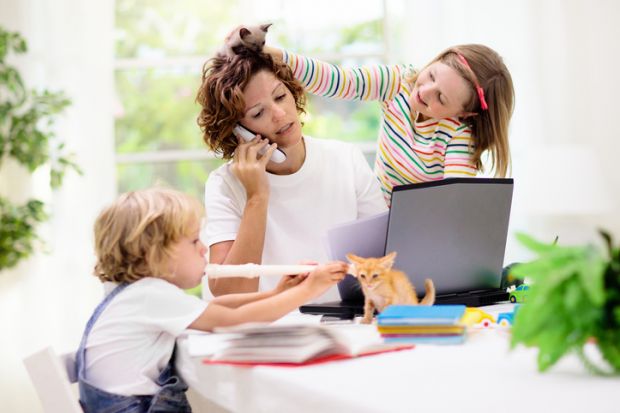When the UK announced its coronavirus lockdown, Nadia von Benzon had her hands full with five children under the age of 10. But if that was not hard enough for the lecturer in human geography at Lancaster University, she was left with full responsibility for them when her husband was struck down badly with Covid-19 two weeks later. “Personally, it’s been very difficult,” she said. “I’ve only been able to work one or two hours a day.”
Dr von Benzon said she found employers sympathetic towards working parents at the start of the school closures, but over time expected them to settle in and increase their productivity, “as though caring for a child was like figuring out a new piece of software”.
She said her university had initially discussed her being furloughed to allow her some respite. “I was briefly interested. But then I realised you can’t work at all, you can’t access university platforms – and I had deadlines with publishers. I didn’t want to let my colleagues down.”
To outline the difficulties for academics grappling with childcare for her head of department, Dr von Benzon created a document, which she has also shared more widely. “Of course, there are men doing childcare out there, but overall, the responses to [the document] were from women.”
Many of the female academics Times Higher Education spoke to said they felt “in limbo”, trying to stay on top of administrative or teaching tasks but unable to do much more – particularly research, which is so vital for a career in academia.
Another explained that the uncertainty wrought by lockdown had affected her future planning for starting a family, while another said she also had to care for elderly relatives.
Megan Frederickson, an associate professor of ecology and evolutionary biology at the University of Toronto, said she felt “lucky” because she has only one child and her partner can help with childcare, “but it’s still been really tough”.
“I am absolutely worried about the future,” she said. “I can see it is already starting to affect careers. One PhD student at my university has had to take a one-year leave of absence from her programme because of the lack of childcare. It will only get worse the longer [the pandemic] lasts. Some schools are reopening; some aren’t until September. But we don’t know what will happen going forward − what if there is a second wave and you have to shut everything down again?
“If we get lucky and [the pandemic] ends quickly, there will still be a dip in the progress towards equality. If it goes on for much longer, it will be a significant setback for women,” she said.
Mingzhu Sun, a research officer at the School of Agriculture and Food Sciences at the University of Queensland, agreed. “I’m on a fixed-term contract. I was supposed to go back after maternity leave, but because of the pandemic I’m too worried to send my son to childcare.
“That will impact my career. I don’t know when I’ll be able to go back to work as normal,” she added.
Alessandra Minello, a researcher in demography at the University of Florence, said that at the start of lockdown she was the only one in her family working full time on full pay. “However, I had little time and concentration to dedicate to the writing of scientific articles. The house is not big, the baby was continuously knocking on my door. I felt guilty. Moreover, working meant basically teaching online. That was the priority,” she said.
Later, when her partner was back at work part time, she worked “when I was alone; I did it only during my child’s nap or during the night”.
Dr Minello, who has been collaborating on a project on balancing care and work during the lockdown, said “women with kids are the most penalised. Male and single colleagues were and are working hard and submitting papers. They could concentrate their attention on writing [and] also on new projects related to Covid-19.”
Roopa Dhatt, executive director and co-founder of Women in Global Health, agreed. “Covid-19 grants have very short timelines, and women have fewer hours to contribute to grant writing in current times and, therefore, are losing out on opportunities,” she said.
Dr Minello added that while it was good that “everyone is talking about [the impact on female scholars] now, very few are really doing something to deal with it”.
Register to continue
Why register?
- Registration is free and only takes a moment
- Once registered, you can read 3 articles a month
- Sign up for our newsletter
Subscribe
Or subscribe for unlimited access to:
- Unlimited access to news, views, insights & reviews
- Digital editions
- Digital access to THE’s university and college rankings analysis
Already registered or a current subscriber? Login








